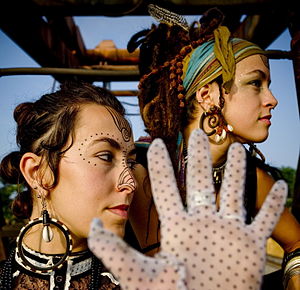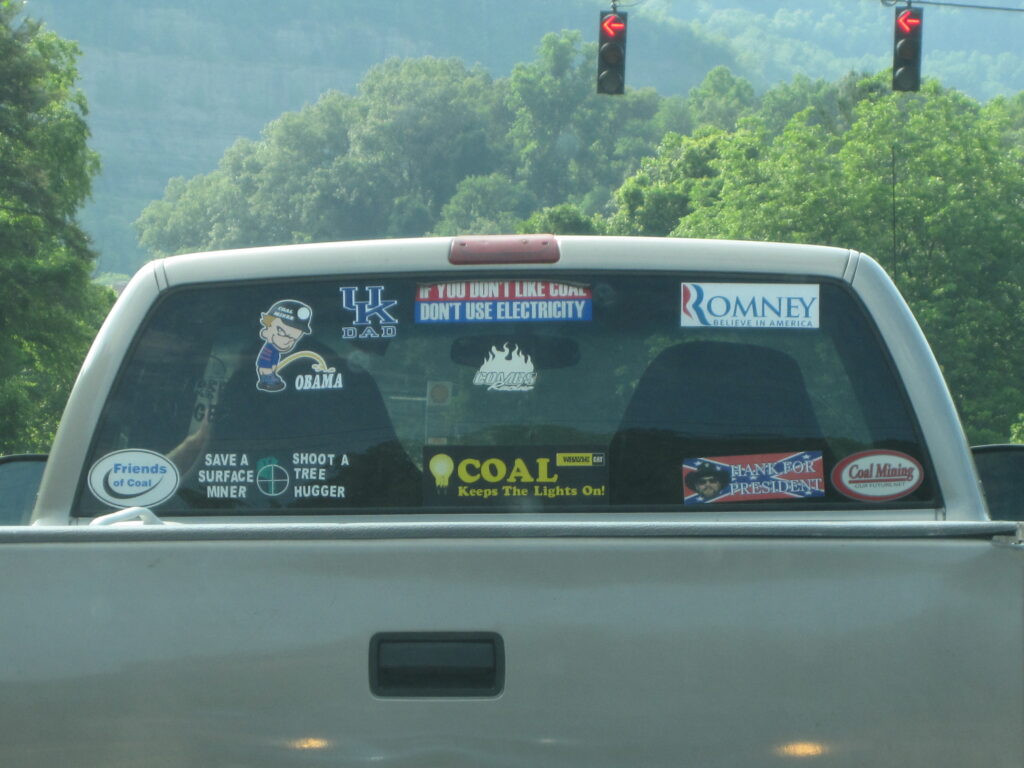June 5, 2025: I wrote this not longer after defending my undergraduate thesis on negative environmentalist stereotypes in Appalachia. I later continued this course of study at Virginia Tech as a master’s student in sociology. There, I learned about the non-profit industrial complex and that some larger environmental organizations actually thrive on creating division between local workers and environmentalists.
I tend to get flak from both sides these days. Environmentalists distance themselves from me because I am often critical of them. Pro-coal folks tend to dislike me for my stance against coal and coal companies. It only goes to show that telling the truth has never been popular, or easy.
So, let’s get to it.
Coal mining families are not very receptive to environmentalists—and that’s putting it lightly. Why should they be? In what way have environmentalists approached coal mining families over the past two decades? In what way have environmentalists presented themselves to the public?
Though most environmentalists have their hearts in the right place, I’m afraid they’ve done a poor job of translating it to the public. I’m not entirely surprised then when the knee-jerk reaction of coal miners and their families is to identify environmentalists as “out-of-touch.”
Appalachian Outsider Stigma
For well over a century, we’ve had our fair share of people coming into the mountains to make fun of us and exploit our resources. First we were dehumanized as senseless, violent, uneducated hillbillies by local color writers and newspapers covering the Hatfield-McCoy feud. Once we’d become the laughing stock of the nation, no one cared when outside investors and land surveyors began unethically obtaining our timber, mineral rights, and large tracts of land. Outsiders forced mountain communities into logging our forests and mining the coal, creating a mono-economy of near serfdom just to obtain our basic necessities including food, shelter, and clothing.
Decades and many blood labor battles later, coal markets plummeted and mechanization put tens of thousands of miners out of work. Extreme poverty caused massive out migrations and intense suffering for those who could not leave. Outside politicians took up our cause for their own political benefit, beginning the War on Poverty and bringing with them media coverage to satisfy the nation’s captious curiosities. Outside reporters and filmmakers trained their cameras on poverty porn wherever they could find it, once again feeding into hillbilly stereotypes started in the days of sensational newspapers and local color writers.
The media attention brought an influx of non-profits and missionaries whose understanding of our situation was often limited to the stereotypes they’d encountered along the way. Some, not all, looked down their noses at us thinking we were poor because we just didn’t know any better, seriously damaging our pride and angering many.1
That being said, the issues are still there. There are still media outlets that seek out the worst among us such as the Wild and Wonderful Whites of West Virginia. I remain skeptical of many outsiders myself, and will vet news agencies, reporters, and non-profits who are looking to exploit our communities. I will gladly tell anyone who remotely appears to be looking down their nose at us to go &#*^ themselves, no matter how “well-intentioned” they think they are.
Appalachian people have had enough of outsiders—for good reason.
For the longest time, unions formed the social fabric necessary to combat the greed of coal companies while keeping the memory of our exploitation alive and well. When the unions were busted throughout the 80s and 90s, the industry seized the opportunity to re-write our cultural memory in a truly Orwellian fashion. But they couldn’t do it alone. They needed a catalyst to cement it.
Enter the Environmentalists
Starting in the late 90s, coal companies began mountain top removal (MTR) mining that was beyond devastating to the local environment. When it made national news, environmentalists began taking notice and came to the region to help. Their intentions were to stop the mines, but few stopped to think about the economic impact it would have on mining communities, much less how they’d be perceived.
Industry associations didn’t miss a beat and did an excellent job swaying the opinions of coal mining families. I just can’t seem to quote Upton Sinclair enough, “It’s difficult to get a man to understand something his salary depends on him not understanding.” Industry PR firms scared the hell out of mining families with fears of mine shutdowns. They also told us that Appalachia was “coal” (see Bell & York, 2010) and that any threat against coal was a threat to our pride and heritage. They’d also done their research and even began pointing out environmentalists as the new outsider threat to our way of life.
With their vast financial resources to promote their message, and the economic captivity of mining families within a well-established mono-economy, they painted a picture of environmentalists as being “out-of-touch tree hugging idiots” who support the “War on coal.” Unfortunately, it was all too easy to do.
Many environmentalists who descended into Appalachia played right into the negative environmentalist stereotypes coal companies were spreading. They looked the part, which was often very different from local culture. Some were not content with only fighting for environmental justice, but also pushing their personal lifestyles and culture that grated against the more conservative religious norms of the area.
With the best of intentions, they did things their way, working to shut mines down not realizing they were inadvertently telling mining families that their way of life was wrong and that they had to change it.

They did this so perfectly that I’ve often wondered if coal companies didn’t send in a few folks to help. In years past, coal companies would send undercover agents into the unions and suggest members participate in acts of violence against the company. When they did, the companies and corrupt law enforcement would crack down hard on them while the pro-company newspapers painted the entire union as a group of violent radicals. Why not do something similar to environmentalists and discredit them among coal mining families?
If they could get environmentalists to keep portraying the negative stereotypes people know them for, environmentalist’s credibility within local communities would become permanently damaged. People would not listen to new information about the environmental health impacts of mining. Even if they did listen and understand, most people would never speak out for fear of being considered a “tree hugger”(see Bashir, Lockwood, Chasteen, Nadolny, & Noyes, 2013).2
This is the game that is played. And it is played.
The pro-coal/anti-environmentalist bumper stickers, “Save a Surface Miner, Shoot a Treehugger,” “Coal Keeps the Lights On,” “Don’t like Coal, Don’t Use Electricity,” “Let the Bastards Freeze in the Dark” and “I love mountains, the coal underneath them pays my bills” are excellent examples. I’ve personally been in safety talks where mine management tongue lashed environmentalists to the cheers of my co-workers.
I eventually had to ask myself, “How in God’s name can so many environmentalists not realize they are doing more to polarize the situation than to help it? How long can they keep blaming coal mining families for ‘voting against their best interests’ which is just another way of saying they are stupid, backwards, industry loyalists? When will they stop denying their accountability for their own failures as grassroots organizers?”
After spending ample amounts of time with environmental organizers and activists, at the end of the day, I had to realize that perhaps they were just as “out-of-touch” as Appalachian people think them to be. They’ve kept repeating the same courses of action over and over. They’ve continued acting in ways that conflicted with the local culture. They’ve kept shoving their message down everyone’s throat in the way they want it to be given (protests, civil disobedience, all with some participants forcing counter cultural attitudes through their appearance).
I’ve even heard some environmentalists say, “I’m fed up with talking to coal miners. They won’t LISTEN.” Well, I’m sorry to tell them that the majority of people in central Appalachia are connected to coal mining because their entire economy depends upon it.
Rather than realizing their approach needs to be changed—rather than understanding that they need to come down off of their lofty moral high ground and start talking to the people on their own terms—environmental organizations have become the uppity, elitist outsiders that Appalachians have distrusted and despised for generations.
A few environmental organizations have understood this problem. Their solution was to adopt a few local citizen activists in order to maintain their “grassroots” status. Sorry folks. “Grassroots” organizations are organizations in which the majority of people come from the community. It also means that “grassroots” organizations receive guidance and assistance from outside organizations but are in no way controlled or influenced by them or their grant funding. If the majority of Appalachians are tied to coal, then it should also be true that a grassroots organization would be made up of people who are tied to coal. It would also mean that the non-profits in question would have their main offices located in the region, not just in the outskirts or DC suburbs.
A true just transition will never take place until people living in Appalachia are no longer dependent upon the mono-economy of coal. It will take creating new policies that phase out coal while requiring the companies to clean up their messes, and policies that enable Appalachians to build their own local economies from within while providing them all the necessary resources to do so.
Getting there will require electing politicians not easily bought out by coal. That will only happen when people begin to see hope beyond the coal industry. So long as they are pushed into an ‘us vs. the environmentalists’ debate by well-funded coal associations and environmental activists who preach rather than understand, we will never expect to see any progress.
At this point, even though environmentalists are on the side of positive change, they just simply do not have the credibility necessary to persuade people living in Appalachia that change can and must come. That’s why many organizations working in economic and community development won’t go anywhere near the subject of the environment. It’s sad too. I have many friends that are environmentalists and I know for a fact they have their hearts in the right place (or else I wouldn’t be friends with them).
Hundreds of environmentalists banded together to bring water to people in need during the Charleston, WV water crisis, and not just the city dwellers. Many jump at the chance to help people, be it digging mud out of basements after flooding, raising money to help people who’ve lost everything, to working in people’s gardens, and so much more. Many of them I believe are more selfless than some Appalachians I know these days.
But the truths are there, environmental organizations and activists have no credibility and they won’t have until they can take a long hard look in the mirror and see how they’ve portrayed themselves to the greater public of Appalachia’s coal mining communities. I hope to, that coal mining families will read this and realize that all environmentalists aren’t bad people, they just tend to let their passion and analytical/academic minds overrun their common sense.
And while we’re here. When it comes to the environment, most Appalachians do want to protect it. Many love being in the woods—what’s left of them at least. No matter which side folks are on, they have to start admitting that the coal industry has done more damage to the land than anyone would like to admit.
I think folks do realize that replacing woodlands, natural springs, and clear streams with acidic mine drainage, runoff from coal slurry impoundments, and strip mines, may actually have something to do with the higher cancer rates we’re seeing. Yes, yes, it also has to do with poor access to health care, poor food choices, smoking, drug abuse, and all the like…but most of those issues are directly related to poverty which is caused by a mono-economy built by the coal industry. In other words, coal is, and always has been, the problem. But it is also everyone’s economic lifeline at the moment.
The only way forward, as I see it, is if people in Appalachia are given other opportunities at earning a living wage. As I said before, that will only come with a change in the political landscape, and that will only come when people no longer have someone to hate more than the coal company politicians, politicians I might add, who are at least willing to talk to us on our own level, even if it is to help their coal company buddies screw us out of more labor and resource wealth.
Bashir, N. Y., Lockwood, P., Chasteen, A. L., Nadolny, D., & Noyes, I. (2013). The ironic impact of activists: Negative stereotypes reduce social change influence: The ironic impact of activists. European Journal of Social Psychology, 43(7), 614–626. http://doi.org/10.1002/ejsp.1983
Bell, S. E., & York, R. (2010). Community Economic Identity: The Coal Industry and Ideology Construction in West Virginia. Rural Sociology, 75(1), 111–143.
Schnayerson, M. (2008). Coal River. Farrar, Straus, and Giroux.

